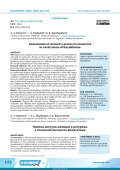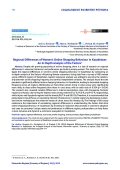Relevance. Ensuring equal access to resources is crucial for social development, especially in rural areas. Women in these regions face distinct challenges due to traditional lifestyles and cultural norms, impacting their access to education, healthcare, and economic opportunities. Addressing these challenges is vital for the overall development of rural communities. Research objective. This study aims to develop methodological approaches to assessing women’s access to resources in rural areas of Kazakhstan. Data and methods. Based on the investigation of methodological approaches, multinomial logistic regression analysis was proposed to assess the impact of regional differences on gender gaps in access to various resources. The study is based on qualitative data collected from May to June 2023 from a sociological survey conducted among women aged 18-60 in rural settlements of Kazakhstan. A total of 600 respondents were interviewed, and 542 of the respondents had completed questionnaires. This methodology enables the collection, analysis, and processing of primary data, aiding in the assessment of gender disparities in resource access. Results. The proposed methodology facilitated a thorough analysis of qualitative data, offering insights into the problem of gender disparities. Most respondents rated their access to social and economic resources as average, suggesting that while there are available resources, they might not fully meet rural women’s needs or expectations in terms of level or quality. Conclusions. Regions like Akmola, Atyrau, Mangystau, North Kazakhstan, Turkestan, and Zhambyl show significant disparities in resource access, indicating regional inequalities. Addressing this gap necessitates collaborative efforts between government and businesses to enhance resource availability and broaden opportunities for rural women.
Despite the growing popularity of online shopping, there is a lack of research on regional differences in consumer behaviour and preferences, particularly among women. The study aims to investigate the regional differences in women’s online shopping behaviour in Kazakhstan by conducting an in-depth analysis of the factors influencing female consumers. Using data from a survey of 400 women across different regions of Kazakhstan, logistic regression analysis was utilised to examine the relationship between online shopping frequency and several independent variables. The analysis found that the pandemic significantly affected online shopping behaviour in Kazakhstan, leading to decreased shopping frequency across all regions. Additionally, we found that women living in urban areas were significantly more likely to shop online frequently than those in rural areas, with an odds ratio of 0.504 (p = 0.014). The research also revealed notable differences in Internet penetration rates, with Karaganda, Pavlodar regions and Astana city having the highest rates among women (93.1 %, 93.0 %, and 94.5 %, respectively), while Atyrau and Kyzylorda regions had the lowest (80.7 % and 80.0 %). Therefore, it is recommended that policymakers should focus on expanding Internet infrastructure in remote regions by developing customised online marketplaces that meet the needs of urban areas like Almaty city. The findings of this study underscore the importance of considering regional differences in understanding the factors that drive online shopping behaviour in Kazakhstan. By investing in initiatives that promote e-commerce adoption and cater to consumers’ unique needs and preferences in different regions, policymakers can help foster a more inclusive and dynamic e-commerce ecosystem in Kazakhstan.

